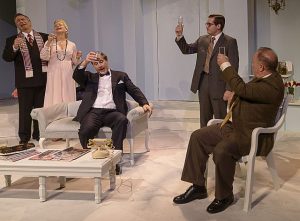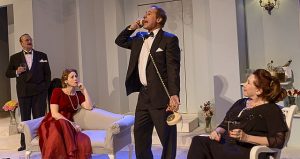RECOMMENDED
Audiences don’t have to ask themselves what do playwrights sometimes think about directors, actors and backers. Moss Hart gives his answer in his 1948 spoof, ‘Light Up the Sky.’

Now at Citadel Theatre, the play offers a behind-the-scenes scenario where a veteran director and actress and a new backer go from fairly confident before the curtain rises, to devastated when they think the show is a failure, to we-have-a-hit exultation when the reviews come in.
Usually co-authoring a play with George S. Kaufman in the 1930s such as ‘You Can’t take it with you’ and Merrily We Roll Along,’ Hart wrote ‘Light Up the Sky alone in the late 1940s. It was first produced in 1948. BTW, Hart moved to writing screenplays in the 1950s.
He already had several successes by this time but in the play, the playwright is portrayed as a newbie who speaks from his gut about the state of the world. The actors and audience aren’t sure what it is about, however the backer feels it is important and a winner.
But on opening night the playwright doesn’t even stay for the curtain. Everyone feels it was a dud and they are ready to close it. The playwright leaves for the airport.
Then, a Shriner at the hotel for a very noisy convention, stops at the room to apologize for this friends and says he would like to back a future play because he wants to be part of the theater business. He brings reviews which show that the critics unanimously love what the playwright is trying to do.

Brought back to the hotel from the airport by force upon a request of the backer who has with mob connections, the playwright is venomous in his condemnation of directors, actors, backers and audiences. And yes, he did have a chance to read the reviews at the airport.
Rather than a tribute to show business, the play is more like a comedic, deliberately exaggerated, putdown of the people who populate it. and audiences who don’t understand a show’s message. But it also seems to declare that if play writing is in your blood you learn to put up with others’ foibles and develop a hard shell.
At the end, the playwright is convinced by a seasoned playwright to persevere. So he decides to stay and fix his play for the remaining out-of-town tryouts before going to Broadway.
All the action takes place in the leading lady’s suite at the Ritz in Boston, the town where the play is premiering before possibly heading to Broadway.
The veteran playwright who has worked with the leading lady in his plays, is visiting her in her suite before the show. He calms the young playwright with advice about accepting both the good and frustrating aspects of show-business.
Directed by Pat Murphy, the play is populated by characters with over-the-top personalities such as Carleton Fitzgerald, interpreted as an emoting, emotional director by Geoff Isaac and as Francis Black, played by Sarah-Lucy Hill as a NYC, nasally-sounding, ice-skating, show-girl married to backer Sidney Black.
Surprisingly, Rob Frankel as Sidney who has mob connections, doesn’t sound like a gangster but plays the role with terrific, intelligent, take-charge fortitude. Similarly, Laurie Carter Rose isn’t overly dramatic as the leading lady Irene Livingston but still personifies celebrity.
The sanity foils to the overblown persona in this show are Chuck Quinn, very believable as veteran playwright Owen Turner, Irene Currie who is charming as Livingston’s bio-ghostwriter Miss Lowell, and Jim Heatherly as Shriner William H. Gallagher.
In the hands of Jordan Golding, playwright Peter Sloan shows two sides: quiet and anger.
Added to the mix are the star’s mother, Stella Livingston, a delightful, gin-playing character performed with verve by Lauren Miller, and the star’s husband, Tyler Rayburn, a Wall Street broker, acted with great humor and facial expressions by Chuck Dribin.
Scenery by Eric Luchen and costumes by Paul Kim nicely set the right period and place.
The play offers interesting insight from different perspectives from a playwright who knows what it takes to get to Broadway. But though fun, it doesn’t have to be two and a half hours long. The first act definitely can be shorter. Perhaps one intermission of 15 minutes could replace the two ten minute breaks.
‘Light Up the Sky’ is at Citadel Theatre, 300 S. Waukegan Rd., Lake Forest, through Oct. 29, 2017. For tickets and other information visit Citadel.
